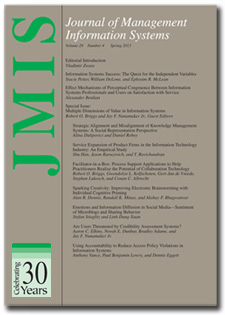特刊简介
IF 6.2
2区 管理学
Q1 COMPUTER SCIENCE, INFORMATION SYSTEMS
引用次数: 0
摘要
事实证明,近年来对组织和整个社会来说是有记录以来最具挑战性的几年。一场全球多年流行病、由论战性政治话语引发的暴力以及由(致命的)种族不平等引发的社会正义运动,只是改变我们工作和生活方式的重大事件的几个例子。疫情改变了我们履行工作职责的方式,也改变了我们如何利用技术跨越时空进行合作。政治话语引发了新的社交媒体现象,如假新闻和深度假视频。社会正义运动将多样性、公平性和包容性问题放在了许多组织的首要和中心位置。与此同时,信息系统和技术也出现了加速变化。人工智能(AI)已成为组织和家庭的主流应用。社交媒体应用程序不断发展,改变了我们共享信息、相互互动和形成社区的方式。精通分析和数据科学的信息系统专业人员已成为最稀缺的组织资源之一。这些社会挑战和技术进步共同改变了组织和个人创建、接收、解释、分析信息和对信息采取行动的方式。随着我们发现新的工作结构、新的技术人际关系和新的分析技术,从海量信息中寻找洞察力和提取知识,社区和组织价值创造的本质正在发生变化。本特刊介绍了高级研究,分享了对社区、组织和个人如何使用信息和信息系统创造价值的新方法、新技术和新理解的见解。第一篇论文聚焦于一种设计方法:Thorsten Schoormann、Maren Stadtländer,以及Ralf Knackstedt,证明了在开发方法中添加反射镜的重要性。具体而言,作者报告了一项多方法研究,包括文献综述、半结构化访谈、案例研究和软件原型,以开发关于如何将反思融入设计思维的规定性设计知识。他们对设计思维话语的贡献是重要的,因为它容纳和组织了具有不同价值观、知识和偏好的团队,以积极学习他们的经验,并为未来的设计工作提供信息。Evren Eryilmaz、Brian Thoms、Zafor Ahmed和Howard Lee的下一篇论文《协作学习软件学习社区的形成和行动》提出了一项基于群体认知、知识构建,以及学习分析,以展示如何通过专门的异步在线讨论(AOD)工具来促进学习社区的发展。作者展示了参与者在参与基于《管理信息系统杂志2023》第40卷第1、3–6期的共同创造知识的讨论时,在不同的社区层——中心层、中间层和外围层——进行操作https://doi.org/10.1080/07421222.2023.2172768本文章由计算机程序翻译,如有差异,请以英文原文为准。
Introduction to the Special Issue
Recent years have proven to be among the most challenging on record for organizations and society at large. A global multi-year pandemic, violence resulting from polemic political discourse, and social-justice movements borne from (deadly) racial inequality are but a few examples of the major events that have changed how we work and live. The pandemic has changed where we perform our work duties and how we collaborate across space and time using technology. The political discourse has given rise to new social media phenomena like fake news and deep fake videos. The social-justice movements have put issues of diversity, equity, and inclusion front and center for many organizations. At the same time, information systems and technology have seen accelerated changes as well. Artificial Intelligence (AI) has become a mainstream application for organizations and households. Social media applications keep evolving, changing how we share information, interact with each other, and form communities. Information systems (IS) professionals versed in analytics and data science have become one of the scarcest organizational resources. Together these societal challenges and technological advances have changed how organizations and individuals create, receive, interpret, analyze, and act on information. The essence of value creation in communities and organizations is shifting as we find new work structures, new technologyhuman relationships, and new analytical techniques to find insight and extract knowledge from huge amounts of information. This special issue presents advanced research studies that share insights on new approaches, new techniques, and new understandings of how communities, organizations, and individual use information and information systems to create value The first paper focuses on a design method: “Act and Reflect: Integrating Reflection into Design Thinking,” by Thorsten Schoormann, Maren Stadtländer, and Ralf Knackstedt, demonstrates the criticality of adding a reflection lens to development methods. Specifically, the authors report on a multi-method study that includes a literature review, semi-structured interviews, a case study, and a software prototype, to develop prescriptive design knowledge on how to integrate reflection into design thinking. Their contribution to the Design Thinking discourse is significant as it accommodates and structures teams that experience divergent values, knowledge, and preferences to actively learn from their experiences and inform future design efforts. The next paper, “Formation and Action of a Learning Community with Collaborative Learning Software,” by Evren Eryilmaz, Brian Thoms, Zafor Ahmed, and Howard Lee presents a mixed-methods field study that is grounded in group cognition, knowledge building, and learning analytics to demonstrate how learning community development can be facilitated by specialized asynchronous online discussion (AOD) tools. The authors show participants operate in different community layers—central, intermediate, and peripheral layers—when they engage in a discourse to co-create knowledge based on the JOURNAL OF MANAGEMENT INFORMATION SYSTEMS 2023, VOL. 40, NO. 1, 3–6 https://doi.org/10.1080/07421222.2023.2172768
求助全文
通过发布文献求助,成功后即可免费获取论文全文。
去求助
来源期刊

Journal of Management Information Systems
工程技术-计算机:信息系统
CiteScore
10.20
自引率
13.00%
发文量
34
审稿时长
6 months
期刊介绍:
Journal of Management Information Systems is a widely recognized forum for the presentation of research that advances the practice and understanding of organizational information systems. It serves those investigating new modes of information delivery and the changing landscape of information policy making, as well as practitioners and executives managing the information resource.
 求助内容:
求助内容: 应助结果提醒方式:
应助结果提醒方式:


